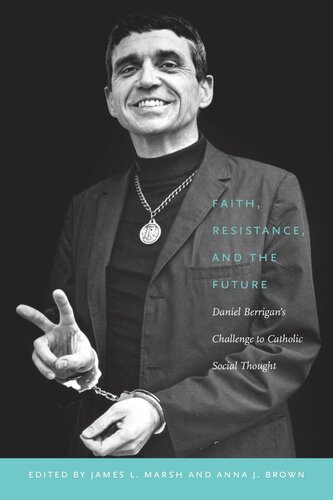

Most ebook files are in PDF format, so you can easily read them using various software such as Foxit Reader or directly on the Google Chrome browser.
Some ebook files are released by publishers in other formats such as .awz, .mobi, .epub, .fb2, etc. You may need to install specific software to read these formats on mobile/PC, such as Calibre.
Please read the tutorial at this link: https://ebookbell.com/faq
We offer FREE conversion to the popular formats you request; however, this may take some time. Therefore, right after payment, please email us, and we will try to provide the service as quickly as possible.
For some exceptional file formats or broken links (if any), please refrain from opening any disputes. Instead, email us first, and we will try to assist within a maximum of 6 hours.
EbookBell Team

4.0
86 reviewsThis book presents Daniel Berrigan’s contribution and challenge to catholic social thought. His contribution lies in his consistent, comprehensive, theoretical, and practical approach to issues of social justice and peace over the past fifty years. His challenge lies in his critique of capitalism, imperialism, and militarism, inviting Catholic activists and thinkers to undertake not just a reformist but a radical critique of and alternative to these realities. The aim of this book is, for the first time, to make Berrigan’s thought and life available to the academic Catholic community, so that a fruitful interaction takes place. How does this work enlighten and challenge such a community? To these ends, the editors have recruited scholars and thinker-activists already familiar with and sympathetic to Berrigan’s work and those who are less so identified. The result is a rich, engaging, and critical treatment of the meaning and impact of his work. What kind of challenge does he present to academic-business-as-usual in Catholic universities? How can the life and work of individual Catholic academics be transformed if such persons took Berrigan’s work seriously—theoretically and practically? Do Catholic universities need Berrigan’s vision to fulfill more integrally and completely their own missions? Does the self-knowing subject and theorist need to become a radical subject and theorist? Even though the appeal of academics is important and perhaps primary, because of the range and depth of Berrigan’s work and thought and the power of his writing there is a larger appeal to the Catholic community and to activists working for social justice and peace. This book has, therefore, not only a theoretical and academic appeal but also a popular and grassroots appeal. Given the current and ongoing U.S. military interventions in Iraq, Afghanistan, and Libya, Berrigan’s work invites us to think about the justice of such interventions or, given the destructiveness of modern weapons, whether the notion of just war makes any sense. Given the recent crisis on Wall Street, does it make sense any longer to talk about the possibility of a just capitalism? Given the most recent revelations about Guantánamo, Abu Ghraib, and Bagram, is it not imperative to think about how torture, preventative detention, and extraordinary rendition serve the ends of empire? In light of all of this, doesn’t Berrigan’s call for a pacific, prophetic community of justice rooted in the Good News of the Gospel make compelling sense?